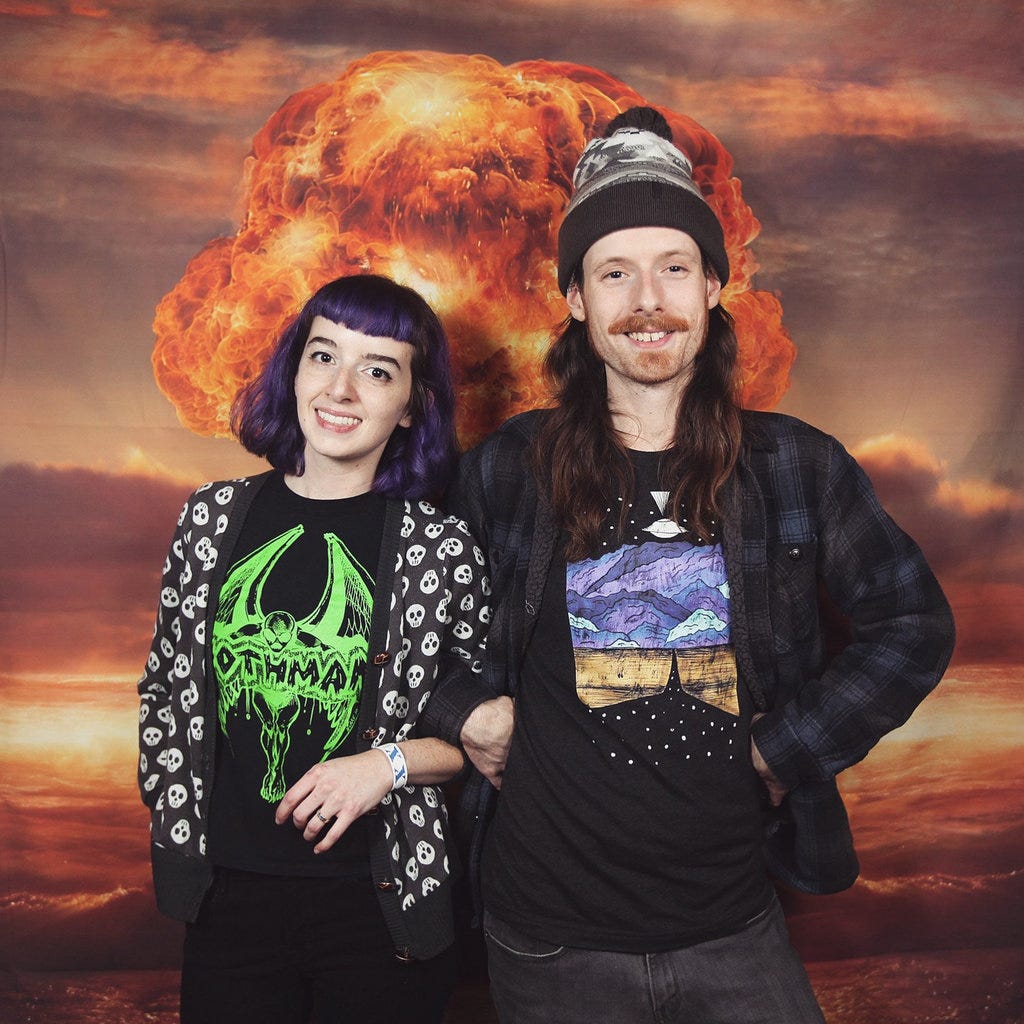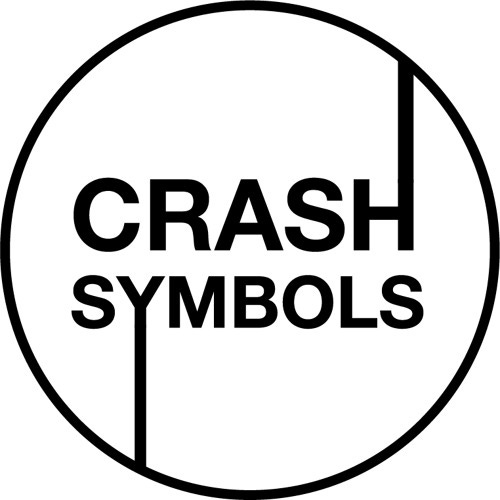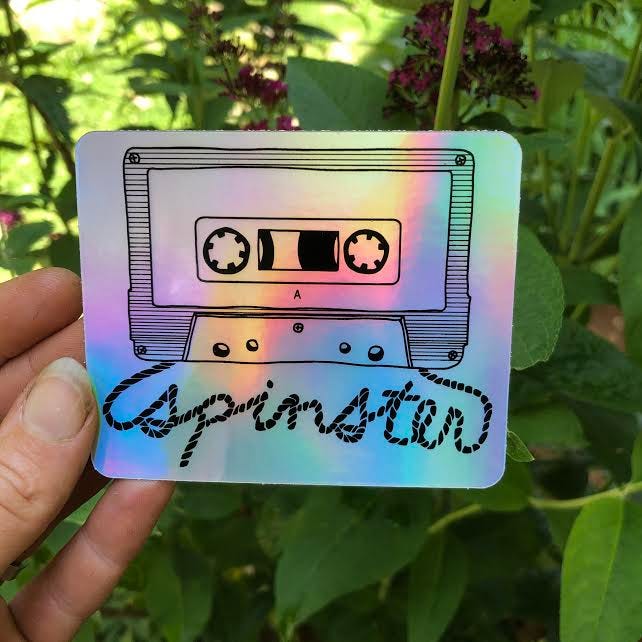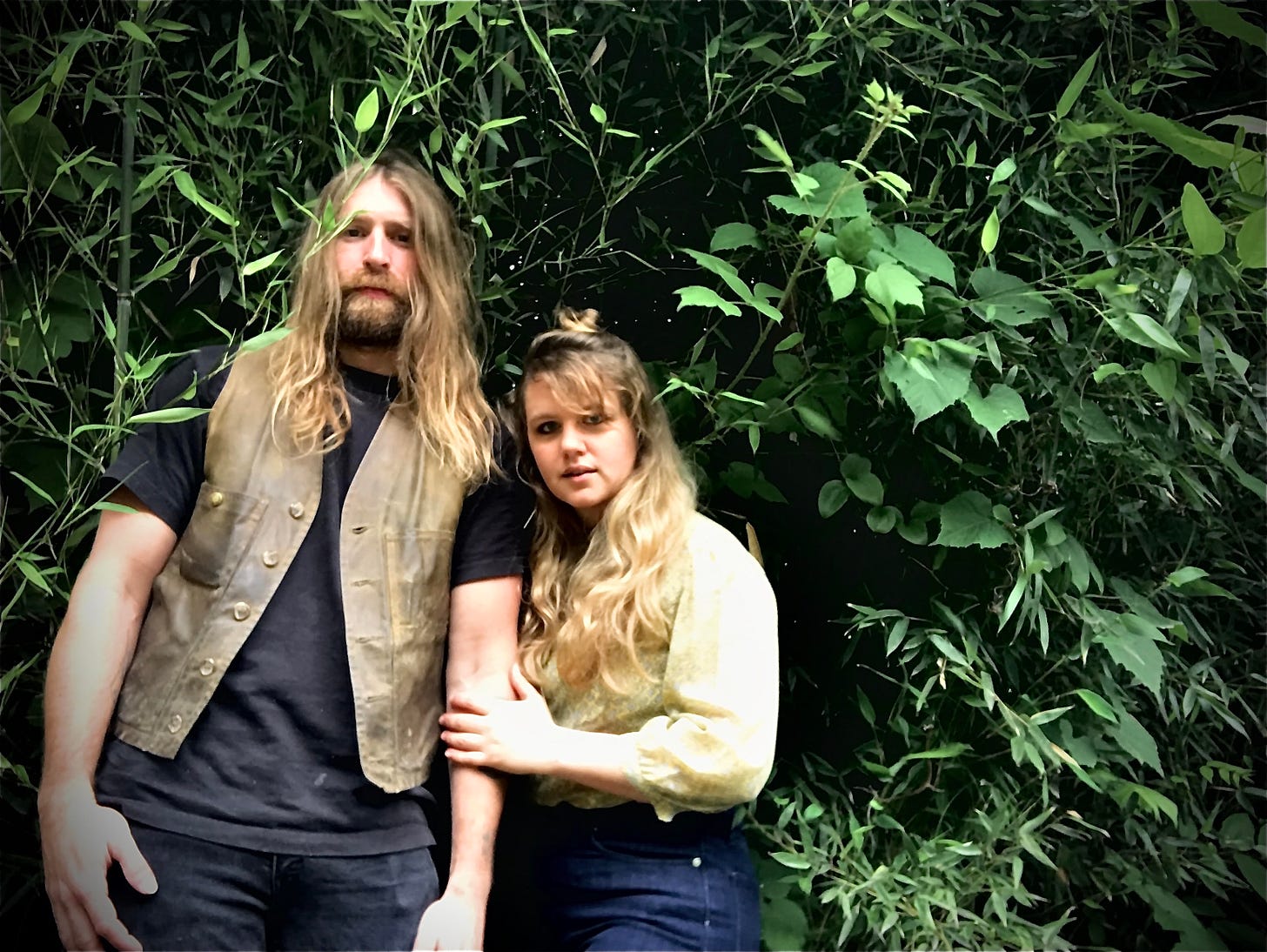
What comes to mind when you read the words “music of West Virginia?” Let me guess, it involves a banjo and possibly a fiddle. Of course, the beauty and historicity of Appalachian folk should not be overlooked as it is foundational to all American music, but there is so much more happening in West Virginia than just the fiddly shit.
In this issue of Weird Girls Post, we’re shining a spotlight on the DIY punks of the Mountain State—and when I say “punk,” I mean it as a lifestyle rather than the genre. I mean it in the sense that these are people who are making music and making things happen despite all the obstacles in their way, most prominent of which is the lack of attention being paid to their worthy efforts. Let’s change that!
First up, we have interviews with Dwight and Liz Pavlovic of Morgantown tape label Crash Symbols (pictured above in what is possibly the greatest photo I’ve ever seen), followed by West Virginia folklorist and Charleston label SPINSTER co-runner Emily Hilliard, and finally Melissa Wright of Harper’s Ferry band Mink’s Miracle Medicine. Taken altogether, these interviews provide three unique perspectives into what it’s like to be a music person in West Virginia and insight into the local scenes in their respective towns, plus some recommendations on venues, record stores, and other cool stuff happening around the state. Then we finish with a list of currently active, extremely cool West Virginia bands and artists. If you like what you hear, please consider supporting them today as it’s another Bandcamp Friday and the revenue shares are being waived so the artists get all the money!
In case you’re lame and don’t read all the way to the end, I want to share this quote from Melissa that I feel really encapsulates something very true about being a music person in this region: “Even when I’m not playing that old music I still feel a richness about being an artist in Appalachia. I can feel that I’m a link in this chain that has been growing for many generations.”
Appalachia is so deeply musical and has such a strong perception of itself as such that is unlike anywhere else I’ve ever been. Mountain people have always used music as a way to connect with and uplift each other and their communities, so it’s natural that this would extend into a strongly held DIY ethos that’s as inspiring and resilient as the state itself. Give it up for the mountain punks.
- Mariana Timony

Crash Symbols
Crash Symbols is a cassette label based in Morgantown, West Virginia. Find their Bandcamp page here.
How long have you been part of the music scene (such as it is) in Morgantown? Are there any specific challenges or benefits to staying in WV versus going elsewhere?
Dwight: I’m from Morgantown and being at home in West Virginia definitely feels like a privilege in lots of ways: proximity to our roots, nature, and a special sort of imaginary space. Most of my creative background now revolves around writing and editing and music. Work can be challenging, but the internet definitely makes it easier to get by. The biggest institutions in West Virginia are hospitals and schools, which historically aren’t very good at employing locals.
Liz: I started playing in local bands in Morgantown around 2010. It can be a bit challenging playing live music in West Virginia (especially if it’s on the noisier end of the spectrum), mostly due to a lack of sympathetic venues and house shows, but that does seem to be slowly changing for the better.
Tell me about Crash Symbols! How long has it been a label? What are your goals for it? You seem like the "biggest" indie label in WV in terms of the amount of releases you've put out and the number of out-of-state artists.
Dwight: We’re coming up on our ten-year anniversary and couldn’t be happier. It’s a strange time and we’re trying to find ways to help, but having the opportunity to continue working with music and tapes and so many creative collaborators is obviously another huge privilege. Helping artists create really memorable and impactful albums on cassette is probably the specific goal. More broadly we want to be as big a resource as possible for that process, whatever the material or circumstances.
What was the scene like in Morgantown before the pandemic hit? Were there venues or any sorts of hubs for people making music?
Liz: The scene was pretty active in Morgantown. 123 Pleasant Street was the main venue for local and touring acts, though they also had a recurring open mic night. Gene’s and Retrotique/Morgantown Art Party are also great local venues. House shows were becoming more common and I know folks are really missing them right now. Pop Shop is a non-profit music academy that a few friends of ours teach at; they’ve worked really hard to provide a space where young musicians can flourish.
Dwight: There are definitely a few really cool venues across the state and Morgantown usually has a great house show culture. Potion Castles was a really fun spot that unexpectedly dovetailed into organizing more live comedy in town, which is a pretty strong little community now. McClafferty's Irish Pub and Morgantown Brewing Company were also starting to do more mixed events. COVID-19 threw a wrench into lots of that stuff unfortunately, but of course we’re hoping they’ll have an opportunity to bounce back.
What are some West Virginia bands/labels people you think people pay attention to?
Liz: Sarah Rudy of Hello June has had some crossover success; she’s an awesome role model for female musicians in-state. A lot of bands are kind of on hiatus right now, but Golden Horseshoe is another favorite, as well as She’s A Wizard and Captain Catfeesh.
Dwight: SPINSTER is a great imprint for sure. We’re really really trying to encourage more musicians, and non-musicians, to start labels and use them as a platform to organize. Not bands or labels, but anyone passing through the state should definitely check out Assumption Records outside of Morgantown and Elk City Records in Charleston. Super different situations, though they both do a lot with their surrounding communities and each manages to keep genuinely interesting stock on hand.
What's the coolest show you've ever played or attended or even thrown in the state? What made it special?
Liz: One of the coolest I’ve played was a Halloween show at a DIY venue called Kamp Krusty. Some folks bought an old church on the bank of the river and converted it into an indoor skate ramp and show space. The stage is right by the ramp so skaters are almost skating over your head while you’re playing. All the bands wore group costumes and everyone just had a really great time that night.
Dwight: Kamp Krusty really is an AMAZING place, so much fun regardless of what’s going on. Voice of the Valley is also hard to beat. The usual location is on a hill beside a creek I grew up playing in, so getting to hop in the water and listen to whatever’s happening up the hill is amazing. The full name of the fest is Voice of the Valley Noise Rally. Though the sounds are a bit more on the “experimental” side, it’s fairly ecumenical and you end up hearing a bit of everything. Always well DJ’ed between sets, too.
What is something you wish people knew about making music or running a label in WV?
Liz: Don’t let anyone tell you that you can’t.
Dwight: That there’s room for them too!
SPINSTER

SPINSTER is a label based in Charleston, West Virginia and Alexander, North Carolina. The holographic sticker above is for sale on their Bandcamp page. This interview is with label co-runner and West Virginia folklorist Emily Hilliard.
What is your background? How long have you been part of the music scene (such as it is) in West Virginia?
I moved to West Virginia from D.C. in 2015 for my job. I work as a folklorist, documenting and supporting vernacular culture, including music, so it's a part of my work life too. But I've played music since I was a kid and have been in various types of bands—folk, old-time, rock experimental—in other places I've lived. I haven't played out too much in WV, but my friend Dan and I (and some other folks) have played together a few times in an experimental/drone band called LORIST, and I've hosted a few shows in Charleston, with artists like Marisa Anderson, Michael Hurley, Long Hots, Slut Pill, Nathan Bowles, Jake Fussell, and Daniel Bachman.
Tell me about SPINSTER! How long has it been a label? What are your goals for it?
My friends Sally Anne Morgan and Sarah (Louise) Henson and I started the label in 2018. Sarah stepped back to focus on her own music, so it's now run by Sally and I. Sally and I had long joked about having a record label, and Sally and Sarah had gone on tour with a guy who runs a label and realized, you know, if he could do it, we could do it too. SPINSTER is mainly focused on supporting music by women and non-binary artists, but we're not restricting ourselves.
We're also interested in drawing connections between genres of music. For example, we think of traditional music as being aesthetically aligned with experimental music, so that’s one value we’re trying to communicate and I think is pretty evident on our Quilt of the Universe compilation. We've been lucky to release albums by four amazing artists, who work across genres too. Rosali, a Philly songwriter who plays acoustic and electric guitar, in her folk-rock solo project, and the more heavy rock band Long Hots; amelia courthouse (Leah Toth) who makes the most beautiful meditative "hymbambient" music; Slut Pill, a "contraceptive rock" band from Eastern Kentucky, the member of which are all traditional musicians too; and Lou Turner, a folk singer-songwriter and rocker from Nashville. We've got some exciting new stuff in the works too.
What was the scene like in Charleston before the pandemic hit? Were there venues or any sorts of hubs for people making music?
To be honest, there isn't as much of a local music scene in Charleston—at least not in the more independent/weird music world corner, as there has been in other places I've lived. It can be difficult to get a healthy crowd to come out to shows, even for artists that I feel like are pretty well-known. Kin Ship Goods (co-owned by my friend Dan, or LORIST among other bands) and Elk City Records are holding that corner down though, with some great shows, and I hope those can pick up again once it's safe to do so. We do have a local music station, but it's generally a little more oriented towards the mainstream. And Mountain Stage hosts regular Americana showcases, and has brought in some cool acts, like Patti Smith and Pere Ubu. There's also a cool and vibrant local jazz scene centered around the Empty Glass, a regional country circuit that plays local dance halls like the West Side Jamboree, and a healthy old-time and bluegrass scene.
Do you feel like the strong folk and old time traditions in the state kind of put a damper on people making other kinds of music in terms of where they can play/what kind of exposure they can get?
I think it's more of a whitewashing and antiquated approach to culture that can typecast people's view of the type of music that gets made in West Virginia/Appalachia. This is a phenomenon I have witnessed and struggle with in my folklore work too. When organizations or venues are looking to book an artist or band that they feel represents the state, they are more often than not, looking for old-time or bluegrass, but there is a wide array of music that is from and of this place—gospel, blues, punk, noise, hip-hop, and traditional music from diverse immigrant communities.
What are some WV bands/labels people you think people pay attention to?
Crash Symbols in Morgantown is a prodigious tape label run by Liz and Dwight Pavlovic, who used to run DECODER Magazine. I'm excited to see Corpse Factory live. And I've always wanted to check out Voice of the Valley. Sierra Farrell is an incredible voice from Charleston, though she lives in Nashville now. I'm looking forward to seeing Lady D's Appalachian BluesSpeak show. Aside from old-time groups (and there are some great ones—The Big Possum String Band and the T-Mart Rounders to name a few), I can't think of too many other local bands, which maybe is telling. I'm sure there are some folks I'm forgetting—I've been quarantined too long!
What's the coolest show you've ever played or attended in the state? What made it special?
Dan and Hillary from Kin Ship Goods hosted an incredible sit-down show with Bonnie "Prince" Billy and The Other Years from Louisville. It was just really beautiful and intimate with great ambience (or as Dan said "a touch of whimsy!"), on a special Charleston weekend that also included a Matewan anniversary screening and Q&A with director John Sayles and producer Maggie Renzi.
What is something you wish people knew about making music in WV?
There's a lot of opportunity and possibility—the scene is wide open. And for touring musicians, please play here!
Mink’s Miracle Medicine

Mink’s Miracle Medicine is a band based in Harper’s Ferry, West Virginia. This interview is with singer and guitarist Melissa Wright.
Tell me about your band! When did you start? Have you toured? Before COVID hit, did you play live often?
My partner Danny and I started Mink’s in 2014. We had both been playing in other bands for a long time, but after getting together we started taking bar gigs to make rent money. We’d play 3-4 hour sets a few nights a week playing country covers and some originals here and there. We kept writing and eventually we were able to fill those long sets with all original songs, so we took those songs and started self releasing a few albums and traveling around the country. We’ve done a lot of touring in West Virginia, Virginia, North Carolina and Pennsylvania, but have gone as far as Oregon, California, and Arizona to tour.
We're laying low on touring indefinitely, but will still be releasing our next record this year with WarHen Records, a small label based out of Charlottesville VA!
What's it like being a musician in Harpers Ferry?
Harper’s Ferry is a unique spot. It’s where the Potomac and the Shenandoah River meet. It’s ripe with history. The town itself is a national historic park, and the views here are epic. I feel like the inspiration here is endless. It’s a quiet town but everyone who plays music knows each other.
There is only one venue in town, The Barn, which we haven’t played at as a band but I love to go hang out and play at their jams. We’re close to other towns with bigger scenes—Shepherdstown, Winchester VA, and we’re a bit more than an hour from DC.
What do you think is unique about being a musician in WV? Are there things that are more/less challenging than they would be elsewhere?
I think West Virginians see the music of this place as a part of a living culture that has to be continued, and learned, and passed down from generation to generation. Old time fiddle and banjo music has a strong hand in culture here, but even when I’m not playing that old music I still feel a richness about being an artist in Appalachia. I can feel that I’m a link in this chain that has been growing for many generations.
By choosing to stay in WV, we’re further away from the people who give artists jobs. Booking agents, venues, managers and record labels—a lot of those things are in cities. But I think the internet is opening opportunities for rural musicians and making it possible to foster strong DIY scenes in small towns. And making national attention possible for the artists who seek it.
What are some WV bands/labels people you think people pay attention to?
Some artists that I’m aware of from West Virginia that are getting attention right now are Rozwell Kid, John R. Miller, Sierra Ferrell, and ONA.
I’m a fan of SPINSTER and Questionable Records. I love how both those labels are weaving traditional and modern music. Ben Townsend of Questionable Records is converting a church into a recording studio. Also Chance McCoy (formerly of Old Crow Medicine Show) has a studio somewhere in (I believe) Greenbrier County. I also love the work of the Travelin' Appalachians Revue.
John Lilly, Darrin Hacquard, Hazel Dickens, Ernie Carpenter, Prison Book Club and The Woodshedders are all WV musicians I’ve spent time listening to.
There are so many more.
What's the coolest show you've ever played or attended in the state?
In December we put on a show with our friends who call their farm “Willbillys.” They built a stage in their barn, we brought a PA system and all our friends came out. We played a set and John R. Miller played as well.
It was a great time— fire jumping, grass, moonshine, music, just an all around great time. All the best shows here turn into wild campfire parties.
I also love playing down at the Purple Fiddle in Thomas WV, and the cajun dances that happen at Augusta Heritage Festival in Elkins.
What is something you wish people knew about making music in WV?
You’re probably gonna have to learn how to play “Country Roads.” Sorry!
Artists of West Virginia
Buni Muni
Buni Muni is the artistic project of Erika Lawson, who is my roommate! Weirdo art-pop that’s campy, funny, and 100% Erika. Regular Weird Girls readers will recognize the horses in the cover art on this single.
Rozwell Kid
Possibly the most “famous” band from West Virginia, Rozwell Kid make Weezer-esque guitar rock with a lot of heart. This is their most recent release.
Strange Dog Weird Man
Comedy rap duo from Buckhannon who write songs about doing drugs and going to Sheetz. They’ve since moved to Pittsburgh and, if you look up where Buckhannon is, you will understand why.
The Settlement
A jazzy, jammy band led by guitarist Colton Settle. I saw this band cover the Talking Heads in Huntington last Halloween and it was sick as fuck.
Ona
A longtime alternative rock band from Huntington, West Virginia.
63 Eyes
Morgantown college rock from the late 80s and 90s. I emailed them to see if they wanted to do an interview, but never received a response. Your loss, 63 Eyes.



